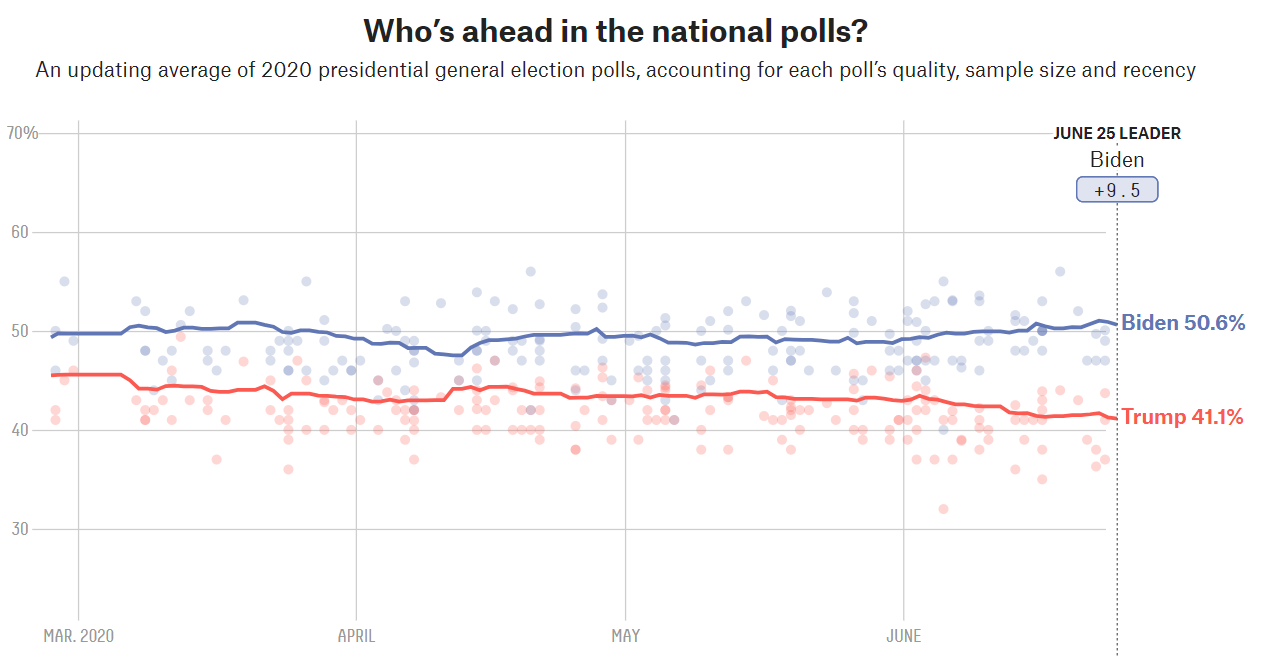With civil protests still raging and the US experiencing a massive resurgence of COVID-19 cases, the 2020 US Presidential election in November is a distant blip for many traders at the moment. While markets are more focused on other developments for now, the election will soon be one of the biggest market-moving events, so we wanted to check in on the state of the race and the possible market implications.
It won’t become official until the Democratic and Republican National Conventions in August, but the two main parties’ Presidential candidates will almost certainly be incumbent Republican President Donald Trump and Obama’s former Vice President, Joe Biden. As polling has started to pick up in recent weeks, it’s increasingly clear that Democrat Joe Biden is in the pole position for the moment.
According to the polling mavens at FiveThirtyEight, Biden holds about a 9-10% advantage in the popular vote; the RealClearPolitics average shows a similar 51%-41% deficit for Trump, with the incumbent President trailing in every single included poll over the last four months. Of course, Trump was able to overcome a deficit in the popular vote to upset Hillary Clinton four years ago on the back of a late shift in undecided voters (of which there are far fewer this time around) and an advantage in the makeup of the Electoral College (something that’s likely to play a role in 2020 as well). Regardless, it’s worth noting that Clinton never held a lead this large in the final six months of the race, so Trump certainly has his work cut out for him:

As we’ve seen in recent weeks, the state of the race can change rapidly in our current chaotic environment, so we’ll continue to monitor the polls periodically over the coming months.
Potential Economic Impact
At this point, neither President Trump nor Joe Biden have had the opportunity to explicitly outline their economic and social policies for the next four years, but given their political prominence over the past decade, we can make certain assumptions about them:
- Neither candidate appears particularly concerned with the federal budget deficit at the moment, with Trump outlining another $1T+ stimulus package focused on state/local governments and infrastructure spending, while Biden appears to support elements of the “Green New Deal” spending plan.
- Likewise, neither candidate has outlined plans for any meaningful tax increases, though given the positioning of the parties, tax hikes would be more likely under Biden than Trump in our view.
- On regulations, Trump has aggressively cut red tape for businesses, whereas Biden may be more likely to impose new rules to protect individuals and the environment. This dynamic could be very significant for companies in the energy and financial sectors.
- Biden is more likely to support increased immigration than Trump, which studies suggest can support long-term economic growth at the expense of short-term disruptions for domestic workers.
- Both candidates seemingly view China’s rising prominence as a potential threat, so tensions between the world’s two largest economies may remain elevated after the election regardless.
At this point in the race, that’s about as much as we can say with any confidence (and even some of these takeaways involve a bit of conjecture!). As the candidates outline their agendas in more detail in the coming months, we will revisit these topics, as well as specific market implications under each candidate – stay tuned!
